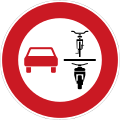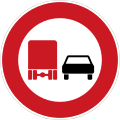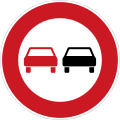Auf Deutsch, siehe weiter unten. (In German language look further down.)
Problem:
In Germany, Austria and Switzerland, and probably other countries, there are traffic signs which regulate which vehicles may be overtaken by others.
For example, agricultural vehicles may be overtaken as an exception in an overtaking ban.
So far there seems to be no solution for mapping this situation in OSM.
According to taginfo, there are currently 195 occurrences of overtaking:conditional=yes @ agricultural.
The problem with this tag is that according to the convention of conditionals it means that agricultural vehicles are allowed to overtake others. However, it is those that are allowed to be overtaken.
Proposal:
What would you think about the following proposal:
overtaking:be_overtaken:*=yes/no
where * stands for all vehicle types that are (passively) allowed to be overtaken or (passively) not allowed to be overtaken.
According to the example discussed above it would be:
overtaking:be_overtaken:agricultural=yes
And in combination:
overtaking=no
overtaking:be_overtaken:agricultural=yes
Problem:
In Deutschland, Österreich und der Schweiz und vermutlich weiteren Ländern gibt es Verkehrszeichen, welche regeln, welche Fahrzeuge von anderen überholt WERDEN dürfen.
So dürfen z.B. in einem Überholverbot als Ausnahme Landwirtschaftliche Fahrzeuge überholt werden.
Bisher scheint es keine Lösung für die Abbildung dieser Situation in OSM zu geben.
Gemäss taginfo gibt es momentan 195 Vorkommnisse von overtaking:conditional=yes @ agricultural.
Das Problem bei diesem Tag ist, dass er gemäss Konvention der Conditionals bedeutet, dass landwirtschaftliche Fahrzeuge andere überholen dürfen. Es sind aber jene, welche überholt werden dürfen.
Vorschlag:
Was würdet ihr denken zu folgendem Vorschlag:
overtaking:be_overtaken:*=yes/no,
wobei * für alle Fahrzeugtypen steht, die (passiv) überholt werden dürfen oder (passiv) nicht überholt werden dürfen.
Gemäss weiter oben diskutiertem Beispiel wäre es dann:
overtaking:be_overtaken:agricultural=yes
Und in Kombination:
overtaking=no
overtaking:be_overtaken:agricultural=yes


